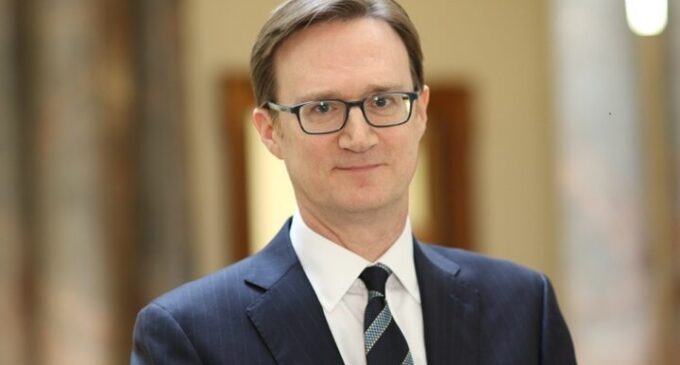Richard Montgomery, the British high commissioner to Nigeria, says Tinubu’s “big economic decisions are being noticed” globally.
Montgomery spoke on Wednesday during a visit to Vice-President Kashim Shettima at the presidential villa in Abuja.
Tinubu recently introduced some reforms in the oil and gas and financial sectors believed to be critical for redirecting the nation’s economy out of the woods.
The president, had on May 29, scrapped the petrol subsidy payments, sending shock waves across the country. The unification of the foreign exchange markets and the relaxing of restrictions on domiciliary accounts quickly followed.
So far, international bigwigs have lauded the policies, including David Malpass, ex-World Bank president, who said the reforms were important in curbing corruption.
Likewise, Montgomery thinks the subsidy removal and exchange rate reforms would create better investment opportunities for the country.
“The big economic decisions being taken by this government are really important and are being noticed around the world,” the UK envoy said.
“The removal of subsidy; the exchange rate reform, all of that create a much better investment environment.
“We know that there are tough times that are going on at the moment, inflation and unemployment.
“The vice-president and I also touched on some of the measures that might be possible to cushion the blow of some of these economic pressures.
“But I think the big issue is that these reforms help put Nigeria on a higher growth path; they will attract more investments and the UK and the city of London see Nigeria as a big opportunity going forward.”
Montgomery said Nigeria and the UK have established partnerships in many areas of common interest.
The envoy said he discussed the long-standing partnership between the UK and Nigeria.
“We have many areas of shared interest, including a good history of development cooperation,” NAN quoted Montgomery as saying.
“Some excellent trade and investment arrangements, and we have also had some good cooperation on security and defence.
“As many of you were seeing from recent talks, we also had good talks on home affairs and justice and we have great people-to-people links that means education.
“We also discussed a number of issues to do with how we can improve our relationships in the future.
“I think we already have a good economic dialogue, but I think there is a great potential to do more; as I discussed with the vice-president.
“I will be doing my part to try to boost those, enhance trade and investment.’’
‘NIGERIANS MAKE UP 10% OF VISITORS COMING TO UK’
Speaking on the recent British policy on students’ visa, he said the UK granted three million new visas in 2022.
According to Montgomery, 325,000 of the visas granted were between Nigeria and UK, adding that the restriction on bringing dependents was also directed to many other countries.
“So, Nigerian visitors constitute over 10 percent of the people coming to London and the UK,” he said.
“On the issue of students’ visas, I will also like to provide the context that the number of Nigerian students coming to the UK has increased five-fold in the last three years.
“It is a fantastic success story for our universities and we are really delighted that so many Nigerians are coming to the UK.
“I think there are two issues here; the first is: it is not always possible to find housing services to meet all the needs of all our existing student population.
“Secondly, I think reasonable people will accept that we have to manage our visitor numbers and that we have to manage migration in and out of the UK; just as the Nigerian government does for your own borders.”









